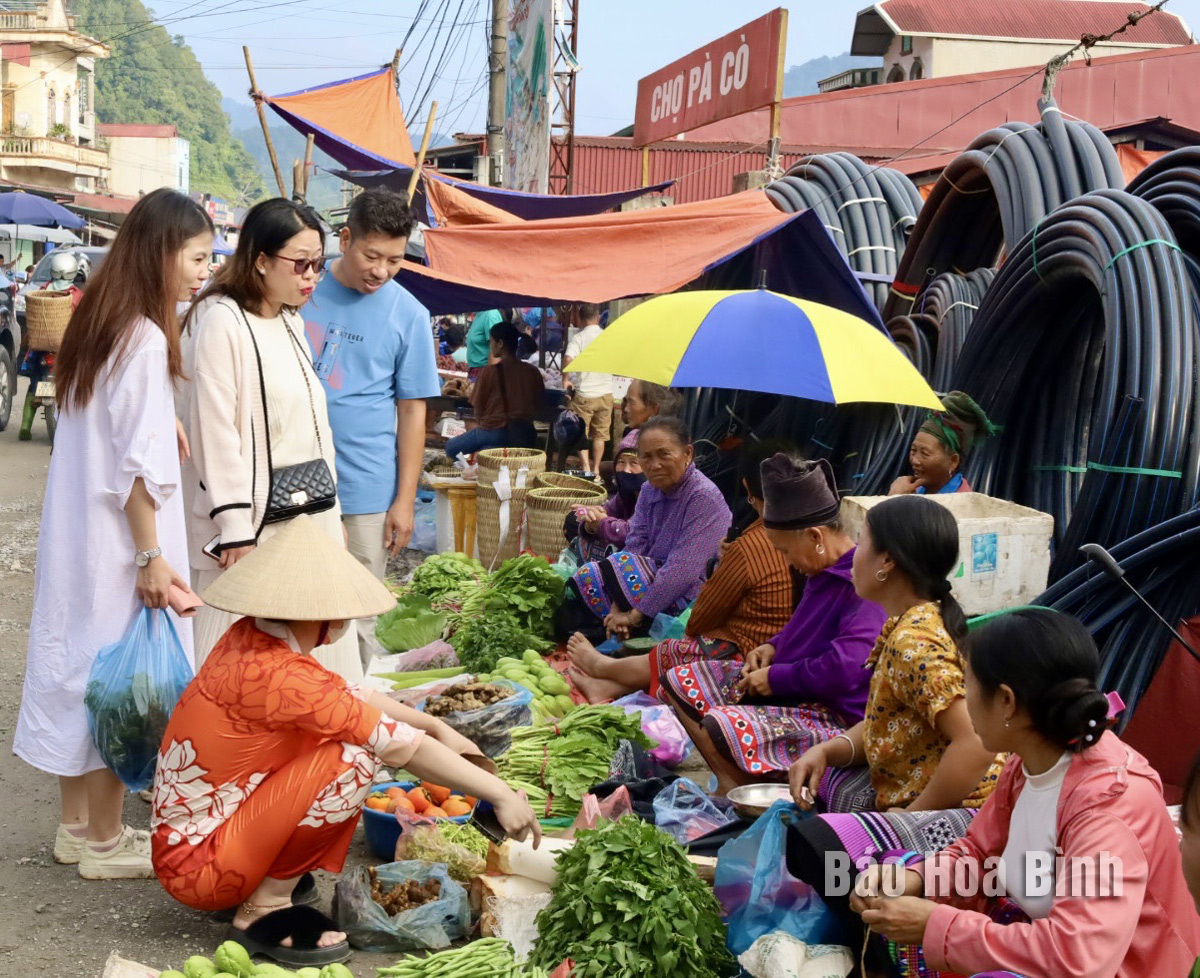
The life of Mong people in Hang Kia and Pa Co communes of Mai Chau district has improved much thanks to tourism development.
Tourists visit the Mong ethnic market in Pa Co commune, Mai Chau district, Hoa Binh province.
The two communes usually become much busier on weekends when domestic and foreign tourists flock to experience and explore the local daily life.
Phang A Pao, a farmer in Cha Day hamlet, Pa Co commune, said that since 2017, his family and some households in the hamlet have combined agricultural production with community-based tourism development. Their daily life and production such as growing rice, harvesting Shan Tuyet tea, dyeing indigo, painting beeswax, and making paper are utilised and exploited as tourism products.
In the last few years, transport infrastructure in the two communes has been improved, creating favourable conditions for tourism development. Tourists can easily travel to destinations by motorbikes, cars or coaches. Other infrastructure of telecommunication, electricity, clean water has been improved too together with attention being paid to increase quality of human resources for tourism, and financial support for ethnic minority households. With the effective preservation of traditional cultural values and natural resources, the two communes have become attractive tourist destinations.
Cao Thu Ha, a tourist from Hanoi, shared that she has travelled to the communes five or six times. Ha said she enjoy going to the market with the Mong people, practicing beeswax painting, eating hot fried sticky rice cakes and watching the sunrise on the mountain.
There are more than ten homestays in Hang Kia and Pa Co communes. Tourism development has created jobs and sustainable livelihoods for hundreds of local labourers. In Hang Kia commune, a community-based cooperative has been established while in Pa Co commune, homestay services providers established an association to support each other.
Community-based tourism sites in the two communes welcome visitors all year round with the high season falling in summer, long holidays, new year celebration of the Mong people and Lunar New Year.
They are also focusing on exploiting new and attractive tourism products associated with ethnic cultural identity to attract tourists, such as Mong ethnic cultural exchange night market, cloud watching or night camping in Hang Kia.
According to Chairman of the Farmers' Association of Pa Co commune Phang A Song, the community-based tourism models have significantly changed the life of local Mong people. Tourism development not only helps increase income for local residents but also contributes to better protection of natural resources as people are aware of the importance of keeping forests and creating ecological landscapes. Local unique cultural features are promoted while people can better sell agricultural specialties and handicrafts.
Located just a 20-minute drive from Hoa Binh City, Ora Hill Farmstay & Glamping Hoa Binh is a captivating new destination nestled in Mo hamlet, Bình Thanh commune, Cao Phong district. Combining farming with leisure, this tranquil retreat is perfect for those seeking balance, joy, and an immersive experience in the expansive beauty of nature.
Muong Bi - Tan Lac is renowned as one of the four famous Muong regions in Hoa Binh province. Blessed by nature with a favourable climate and stunning landscapes, Tan Lac holds great advantages for tourism development. The local tourism industry has made remarkable strides in recent times thanks to the attention and support from the local authorities and sectors.
With its strategic location, well-developed transport network, and diverse soil and climatic conditions, Hoa Binh is emerging as a must-visit destination in Vietnam's northwestern tourism corridor. The province boasts numerous attractions, including the Kim Boi hot springs (Kim Boi district), the Dau Rong cave complex (Cao Phong), the Mai Chau valley (Mai Chau), and the iconic Hoa Binh hydropower plant.
The northern mountainous province of Hoa Binh has been listed among the 71 most beautiful places to visit worldwide by the prestigious US travel magazine Condé Nast Traveller.
Hoa Binh province’s rich natural and cultural resources position it as a prime location for developing community-based tourism (CBT). In recent years, support from central and provincial policies, as well as assistance from non-governmental organisations, have encouraged local ethnic minority and mountainous communities to actively engage in the sector.



